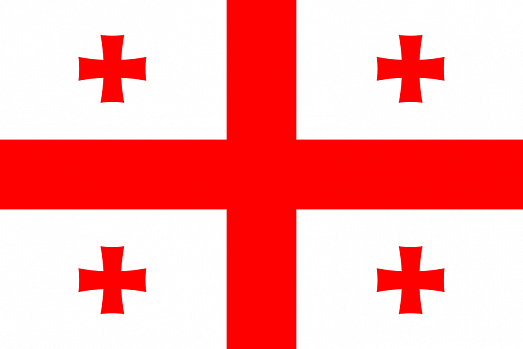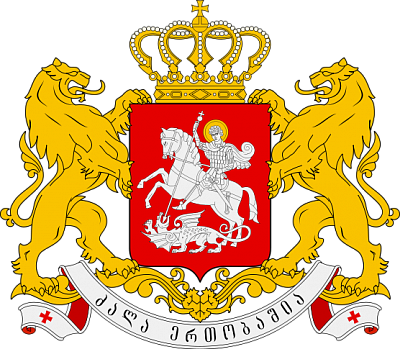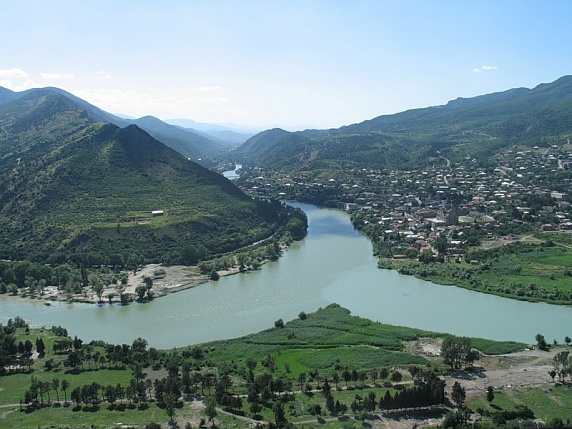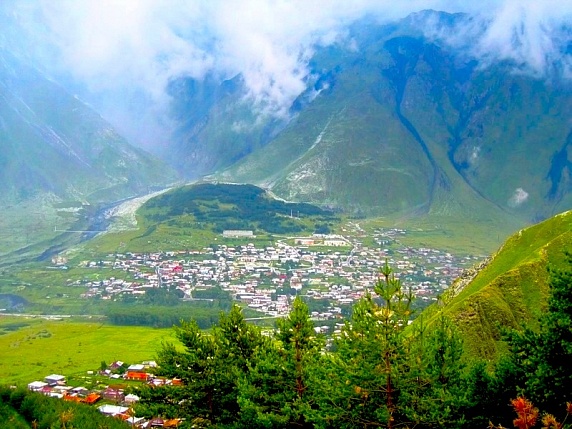 Georgia
Georgia
Transcript of Remarks and Response to Media Questions by Russian Deputy Minister of Foreign Affairs/State Secretary Grigory Karasin at Press Conference at RIA Novosti News Agency, Moscow, August 10, 2008
Good afternoon, ladies and gentlemen, dear colleagues.
Today is the fourth day of tragic events, of a real humanitarian tragedy and catastrophe which began after what I think is the criminal decision by the Georgian leadership to subject to massive attack with the employment of all available modern weapons the city of Tskhinvali and South Ossetia as a whole. The results are truly catastrophic. More than two thousand people have died, mostly Ossetians. Among them the majority are Russian citizens. More than 30 thousand were forced to go away from their villages, leave the city of Tskhinvali and lose a roof over their heads, and medical assistance. These matters, as you know, are now being actively tackled by the Russian government.
What happened in Tskhinvali bore the obvious hallmarks of genocide against the Ossetian people, and quite naturally, needs legal analysis. Politically what has taken place after Georgia's aggression against South Ossetia has completely undermined the process of the search for a peaceful solution to the Georgian-Ossetian problem. The situation is thrown back decades. Both the international community and Russia, first of all, will have to ponder again how to return this situation to a normal predictable course. Trust in the present Georgian leadership has been fully undermined. It has proved its criminal irresponsibility at a critical moment for its own country.
The tragedy of South Ossetia has also thrown new light on the role of the international community and shown the dangers inherent in the cynicism and double standards which, unfortunately, are intrinsic to a number of states who consider themselves, nevertheless, responsible members of the international community. Having used a right to self-defense, since Russian citizens have died, including Russian servicemen who served in the peacekeeping contingent and were on the territory of the foreign state in accordance with an internationally recognized mandate, Russia in difficult battles is now conducting a peace coercion operation. You have heard, I understand, the sufficiently capacious report of the representative of our General Staff concerning the military aspect of this operation. But what matters most is that our military personnel, our peacekeepers are carrying out the absolutely necessary work of restoring a sense of security to South Ossetia and the region as a whole that is so required for the existence of countries, peoples and individuals.
All this is surrounded, naturally, with flows of disinformation. The Foreign Ministry has been closely tracking the development of the situation and watching the evolution in public opinion, but most importantly – maintaining contact with all our international partners, and international organizations. You know that, on Russia's initiative, several UN Security Council meetings have been held in the last few days where the Russian representative reported in detail what we think of the crisis situation and of the tragedy that is taking place, named the culprits, and logically explained our approaches. I consider this to be important. And yet I have to note that the position of certain members of the international community gives rise to serious doubts as to how responsible they are in working out their own assessment of what is happening. I will cite a concrete example – the statement of the three Baltic states and Poland has become known today concerning their attitude towards the events in South Ossetia, in which they accused Russia of no less than an imperial and revisionist policy. I leave it to you to judge the quality and timeliness of such a statement, but I want to say that the most cynical and inopportune forms have apparently been found to express such an incomprehensible and illogical position.
What began on August 7 in South Ossetia occurred because of such signals. The international community ought to rebuke clearly and loudly those taking irresponsible decisions. Everyone must see who has started the tragedy, who has launched the flywheel of bloodshed and who is trying to stop the flywheel and restore normal life in this region of the Caucasus.
We at the Ministry naturally maintain hourly contacts with the Russian embassy in Tbilisi. Judging by the reports of our ambassador and Russia's special representative for South Ossetian settlement who is in the region, Yuri Popov, the situation there is very complicated. We have fears about the fate of the Russian citizens who are currently on the territory of Georgia; somebody is vacationing there, somebody is working. I think that the Georgian authorities ought to responsibly approach these matters, not hinder Russian citizens from moving around in Georgia and to ensure their security. We are also worried about the fact that Georgia has completely deprived its citizens of access to the mass media of Russia, to the television channels and to the Internet while talking about its adherence to democratic values. In my opinion, it is blasphemous to deprive people of access to information which differs from that being served within the country.
Fortunately, thanks to the efforts of our embassy and the peacekeeping contingent led by General Kulakhmetov, who excellently proved his worth both before and especially now, in the days of crisis, it was successfully arranged with the Georgian side for our journalists to be taken out of Georgia. I hold that this is a very good signal. Now our embassy and the peacekeeping force in South Ossetia are engaged in negotiations with the Georgian side to open humanitarian corridors to evacuate civilians and the injured to the north and to the south. These negotiations are nearing completion, it has even been reported to me that they are already completed. These corridors will be set up during the day today. Hopefully the Georgian side will remain faithful to the understandings reached, which, unfortunately, doesn't happen that often with it.
Where further political decisions are concerned, the President of Russia has in absolutely clear and distinct terms outlined the necessary conditions that must be observed by the Georgian leadership. They are an unconditional withdrawal of Georgian troops to the line of South Ossetia, to the 1992 line as determined by the Dagomys Agreement. This is an obligation written down on paper. Unfortunately, such things have to be documented because in words, as the events of early August have shown, the assurances of the Georgian leadership can't be trusted. A pledge not to use force, something which Russia and members of the international community had been insisting on during the past few years; a condition which had, with various dressings, been continuously rejected by the Georgian side. Now, without the realization of such a pledge, there can be no talk about the start of any negotiations with Georgia whatsoever.
I understand that you have questions, so I am not going to deprive you of the possibility of creation.
Question: Yesterday a number of Russian politicians suggested establishing a tribunal following the events in South Ossetia after the example of the Hague Tribunal for Yugoslavia. What is the attitude of the Foreign Ministry to this proposal? And my second question is linked to the air strikes on targets in Georgia. What right does Russia have to deliver such strikes?
Answer: I will start from the first question. I have already said that our peacekeepers, our armed forces, using the right to self-defense, are now participating in a peace-coercion operation. When military actions proceed on such a scale, then, naturally, for any military commander and for any general staff it is important to pay special attention to enemy supporting forces and infrastructure. Therefore, although I am not a military specialist but heard the reply of the representative of the General Staff to this question, I believe that for troops to be able to operate in a normal situation the enemy infrastructure directly supporting combat actions must be in the field of vision and be neutralized. I am not a specialist in the military field, I won't elaborate on this theme any further, but it seems to me that such actions are fully justified; they are logical and are used by peacekeepers and armies of other countries.
As to the proposal of our politicians and lawyers concerning the possibility of establishing a special tribunal for the examination of the humanitarian crimes and crimes against humanity that were in these days committed on the territory of Tskhinvali and South Ossetia as a whole, this thought merits the most positive response. It seems to me that all the facts, all the victims, and the names of all the people who took those irresponsible and criminal decisions must be duly recorded. We ought to forget nothing, we ought to restore in memory each minute, each hour in the development of these events.
I as a direct participant of the process of observation of this drama will also certainly have something to say, because on the night of August 7-8 the Foreign Ministry was working in emergency mode. All of our services were activated, let alone the embassies. Every hour we were reporting about the development of the situation and about contacts jointly with our General Staff colleagues to the top leadership of the country. We well understand how dramatic that moment was, and how responsible the behavior of the Russian leaders, who studied the situation, receiving the reports from the military and diplomats, carefully weighing each word, each response measure of the Russian Federation. That was not easy to do. Therefore, returning to the idea of creating judicial instances which could subsequently investigate what happened, I think it would be reasonable and logical to back up that idea.
Question: Please say what the aims of Russia are in this war; that is, what Russia is fighting for. When military actions are over, what does Russia plan to undertake after this and whether will South Ossetia be recognized by Russia?
Answer: Russia is fighting to ensure that on the territory of South Ossetia and then, by the way, also on the territory of Abkhazia people can live calmly and peacefully, without fearing any sudden night artillery bombardment, any missile strike and destruction of their homes, towns and villages. That's what Russia is fighting for.
South Ossetia and Georgia lie directly on the southern boundary of the Russian Federation. We are interested in seeing all our neighbors live stably and our borders exist in a regime of calm, predictability and friendship. If you have taken notice, then all our leaders, all our politicians, military and diplomats, speaking publicly in these days, have necessarily kept pointing out that there are no complaints or reproaches against the Georgian people – that there is no Georgiaphobia, as it is sometimes said, in Russian society, nor was or will ever be there; because the one million or so Georgians living in Russia are a part of the Russian people. They are a part of our state. And we do not stand against Georgia; we stand against the militarist aggressive course of the present Georgian leadership, which has become vividly exemplified in the events that have been occurring during the last three days.
There must be no repetition of this, and we hold that ours is an absolutely right cause, absolutely justified from the international legal point of view. Although we are for a peaceful solution to be found not on battlegrounds, the situation demands intervention by force. To gaze over the Caucasian Mountain Ridge at those crimes being perpetrated against the Ossetians or Abkhaz – this we do not intend to and will not do.
As to the further development of the situation, let us proceed stage by stage. And if Georgia really removes its units from South Ossetia at once and undertakes to sign a document on the nonuse of force, I think that, having verified this, it will be possible to start negotiations and discuss the state of affairs. They are not going to be easy, though; for, as I've already said, the belief of the Ossetians and Abkhaz that they can safely live in one state with the Georgians has been undermined. Mr. Saakashvili, Georgia's president, has done everything possible and even impossible for that. There's no way he can now prove the opposite, it seems to me. Thank you.
Question: But is the recognition of South Ossetia possible?
Answer: In our life everything is possible that corresponds to common sense and to the aspirations of peoples. But there are also the international obligations of the parties, which Russia has always, unlike certain other countries, been strictly and consistently observing.
Question: Please say, we gather the overall impression that Russia is alone in its position in this conflict and that western countries emphatically do not accept the Russian view and openly act from the pro-Georgia vantage point on the whole. What do you think of the statements of certain sources in the Georgian leadership and the rumors in general about the possibility of intervention of third countries in this conflict? How seriously does the Foreign Ministry take such statements and such scenarios of events? And a second question. Hasn't the question become imminent, in your opinion, of revising the Russian format of participation in the United Nations Organization, in particular, as regards financing of this body? And how do you generally look at the effectiveness of the latest meetings of the Security Council?
Answer: The effectiveness of the latest Security Council meetings, of course, leaves much to be desired. But, at the same time, let us not forget that the UN is the only universal organization in which, when trouble occurs, there is the possibility to speak out and publicly state one's point of view, seeking to get adoption of resolutions, seeking a concrete exchange of views, and therefore the role of the United Nations Organization is not only not declining, it is increasing.
It's another matter, and here I move to the first part of your question, that the West once again missed the opportunity to prove that clichés of the recent past, stereotypes of double standards, of nonobjectiveness, that all this has been overcome. Once again the West behaved strangely in the first hours and on the first day of aggression against South Ossetia, having incomprehensibly hushed it up, and then, as if at the command, many countries, about some of which I have already spoken today, took a stance of criticism and in fact now hinder the conduct by Russian armed forces of the peace coercion operation, casting doubt upon its aims, methods and pace. This causes very serious questions about their sincerity, about their real attitude towards our country and, of course, will be taken due account of in the future, when we hold talks and discourse on themes of a future world order.
Question: The White House has already described the actions of Russia as disproportionate and dangerous. How would you comment on these White House statements? And a second question. How do you think the western media cover this situation? Is that not a kind of Georgian propaganda? Thank you.
Answer: Of course, the fact that Georgian citizens have no possibility to watch news reports of Russian television channels and read Russian newspapers and listen to the Russian radio is an indicator of the extent to which they there strive for the objectiveness of assessments.
As to the western media, it is a well-oiled machine that you are well familiar with, which, unfortunately, shows only the footage and the versions which fit into the groundwork of their own reasoning. Our representatives are not invited to these television channels and to this reporting, as a rule. And, judging by accounts and reports from our embassies, the opinion of the Russian side makes its way with difficulty onto the television screens and newspaper pages and into radio reports. We must draw the appropriate conclusions from this, and intensify our own participation in this public discussion, which we are doing in Moscow and striving to expand our platform via a number of capitals where we could hold the relevant briefings of our experts, diplomats, journalists and political scientists. I think that this will follow. Let us not forget that only three full days have passed since the beginning of the tragedy. We need, of course, to display ourselves in a more powerful way and more rapidly. But objectiveness, absent as it was 20 to 30 years ago in the western media, still has not carved its way, unfortunately, and is not a hallmark of most western television companies and journalists. We ought certainly to try all together to break this stereotype.
Question: … concerning the disproportionateness of action and…
Answer: What reaction do you expect from me? Naturally, this reaction will be negative and I am convinced that, in particular, it will be voiced in our Minister's telephone conversation with Condoleezza Rice that has already begun. By the way, we have had very many such contacts with the Americans in these days. They well know our position, our point of view, but statements are statements, and the appropriate reaction of our government structures to that remark will follow.
Question: Could you comment on how Russia will react to the statement of the Ukrainian side concerning the Black Sea Fleet?
Answer: We have already reacted to the quite cynical statement of the Ukrainian MFA regarding what is happening in South Ossetia; I will not recapitulate it. As to the Black Sea Fleet, it was and remains a factor of stability and security in the Black Sea region. That our ships have put off and took up position off the coast of Abkhazia has been brought on by all the same events that took place in Tskhinvali, and we do not want that they would be repeated in Abkhazia. This is a quite natural action. And the attitude that has of late been characteristic of the leadership of Ukraine towards our Russian Black Sea Fleet, which, as is known, is based both in Novorossiisk and in Sevastopol and will remain in the Crimea until 2017 – negotiations on all these aspects are already being conducted by us and Kyiv well knows our assessment of its latest statements, which do not contribute to the strengthening of partnership relations between our two countries.
Question: Do you confirm the information that Georgian soldiers have already run away from South Ossetia? And a second question: Is it true that…
Answer: Have run away or retreated?
Question: Have retreated, of course have retreated. Does Russia have any plans of blockading the ports on the Black Sea, Poti in particular?
Answer: I do not even know where to begin. Firstly, I would like to inform you that this morning in contacts with Tbilisi we were told that Georgian troops had begun to retreat from the territory of South Ossetia. Our reaction: all this has to be checked. Because it has turned out that you can't take the Georgian side's word for anything. Understandably this is one of the obligatory conditions for resumption of any contacts and negotiations. It has to be verified. Our peacekeepers are in South Ossetia, they can either confirm or refute the fact that Georgian troops are retreating to the line – I call it the line of 1992 – that is, withdrawing from the territory of South Ossetia.
The second part of your question was linked, as far as I understood, to blockade. I am unaware of any such plans.
As to (I will reformulate it my way) the striving to solve at one stroke all the conflicts that exist in the Caucasus – such a solution would be excessively straightforward and simple. This is an extremely sensitive and intricate fabric to be cut at one stroke. And in general, the notion "to cut" is inappropriate here. Russia has always advocated that, firstly, the obligations assumed should be fulfilled, and that the agreements should be complied with. That was why we so insistently kept saying both in the case of Georgian-Ossetian settlement and in the case of Georgian-Abkhaz settlement that the existing formats should be observed, that there was no need to break anything, and that it was merely necessary to gradually move forward. It turns out that the Georgian leadership is unable to embrace this kind of gradual and constructive advance. They need to solve everything today, by force and in their favor. You can't struggle for the territorial integrity of your state in this way. This is the shortest and effective way to disintegrate the state for ever.
Question: Two specifying questions, if I may, regarding the statement of the Ukrainian side that they will prohibit return of the eight Russian ships to Sevastopol if they take part in the military conflict. If this is so, what will Russia do? And my second question concerning economic blockade. There are several reports that oil tankers and commercial ships are being detained and inspected. Now could you confirm or refute this? Thank you.
Answer: Detention and inspection is not a blockade. It is understandable that, in the conditions when military actions are going on, we have to treat very attentively all that which moves to and from Georgia.
We have to give up air service now, to suspend it for a while. We will, naturally, pay more attention to those citizens of Georgia who will now be setting off for Russia and to the Russians or Georgian citizens who will be returning from Russia to Georgia, but this does not at all mean any radical decisions that we would need to specially talk about.
As to the return of the Black Sea Fleet, I think that we will specially deal with this question not at a press conference, but in contacts with our Ukrainian partners.
Question: I have two questions for you. At the beginning you expressed your dissatisfaction with the reaction of the international community. I would like to specify just what reaction does Russia want from the international community? And the second question. Does the Foreign Ministry have any ideas and readiness to switch events to a negotiated peaceful course as soon as possible, nevertheless?
Answer: We would like that not only Russian tanks would be shown on the TV screens in the West, and that the text would be dedicated not only to the fact that Russia has entered the territory of South Ossetia and that Russia is waging war at the boundaries of Georgia, but that these screens would show the suffering of the Ossetian people, that they would show the old people and children killed, and that they would show the South Ossetian villages practically razed to the ground and the Tskhinvali destroyed actually to a stone – now that would be objective coverage. All the rest is called, if you choose diplomatic, so to speak, terminology, a politically motivated story. This is putting it mildly. But after all it is necessary to strive towards showing the events more objectively.
As to the ideas, the Ministry does have them, but now is the stage when the international community, about which you've asked me, must influence the Georgian side in the sense that Georgian troops should retreat to the positions they held before the 6th and that they give a pledge not to use force. After this it is possible to begin contacts and negotiations which will, undoubtedly, be extremely complicated.
Thank you for your attention.








